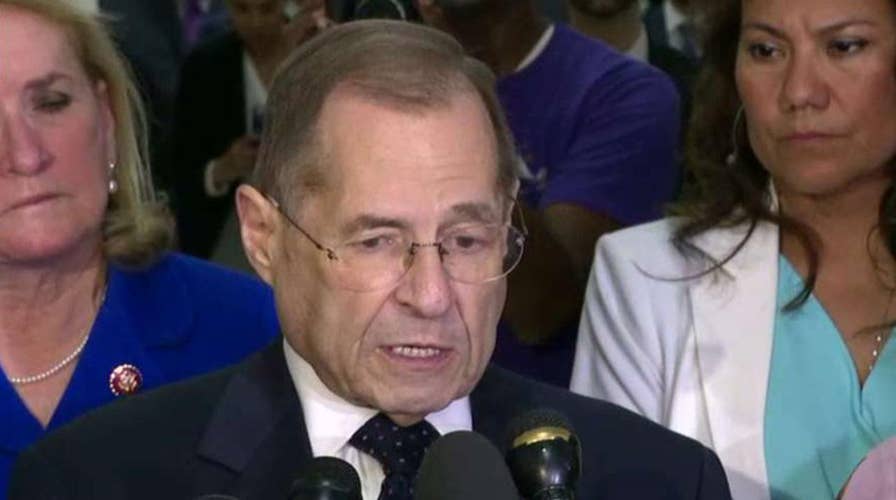Rep. Jerry Nadler: We cannot have a government where all the information is in the executive branch
New York Democrat Rep. Jerry Nadler holds press conference after the House Judiciary Committee voted to hold Attorney General William Barr in contempt.
House Judiciary Chairman Jerrold Nadler, D-N.Y., declared a "constitutional crisis" on Wednesday, but pushed back on impeachment as an option after his committee voted to hold the attorney general in contempt for defying a subpoena for Special Counsel Robert Mueller’s unredacted Russia report and underlying documents.
"We've talked for a long time about approaching a constitutional crisis. We are now in it," Nadler told the press on Wednesday. Although he pushed back on impeachment as an option, he indicated that the United States was at a critical time of testing whether it could stay a republic or transition into a tyrannical form government.
Nadler's committee voted along partisan lines to hold Barr in contempt on Wednesday and angered the White House by not delaying the vote. At the same time, the president invoked executive privilege — refusing to comply with Congressional subpoenas.
Nadler accused the White House of "stonewalling" the American people and attacking "the essence of our democracy."
"They are uniformly rejecting subpoenas from Congress. This means that they have decided to oppose the role of Congress as a coordinate branch of government representing the American people."
TRUMP INVOKES EXECUTIVE PRIVILEGE OVER MUELLER REPORT: HERE'S HOW IT WORKS
"We cannot have a government where all the information is in the executive branch — where the American people and the Congress are stonewalled as to information that they need to make decisions and to know what's going on," he added.
He also compared Trump to former President Richard Nixon in that both refused to release information by citing executive privilege.
Nadler recalled the Supreme Court decision forcing Nixon to hand over tapes of his private conversations with advisers, which he said were the "most sensitive to executive privilege."
"The Supreme Court ruled eight to nothing that the interests of the public in justice and in accountability outweighed the interest of the president in privacy," he said.
FBI OPENED OBSTRUCTION CASE AGAINST TRUMP BEFORE MUELLER WAS APPOINTED, COURT FILES SHOW
When asked why he didn't pursue impeachment proceedings, he said that it may "not be the best answer in this constitutional crisis."
CLICK HERE TO GET THE FOX NEWS APP
The White House, in asserting executive privilege, accused Nadler of engaging in a "blatant abuse of power."
“Unfortunately, rather than allowing negotiations to continue, you scheduled an unnecessary contempt vote, which you refused to postpone to allow additional time for compromise,” Assistant Attorney General Stephen Boyd wrote to the committee.













































